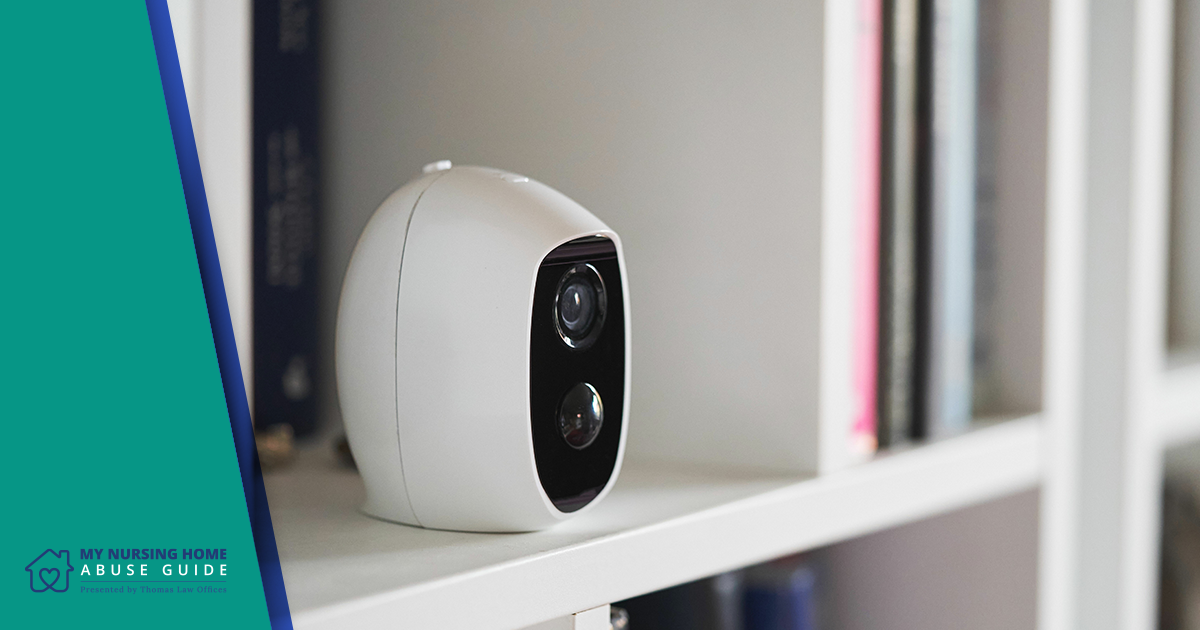Your Guide to Nursing Home Abuse & Prevention
Millions of elderly adults live in nursing home facilities.
Every one of them deserves to feel safe, protected, and respected.
Millions of elderly adults live in nursing home facilities.
Every one of them deserves to feel safe, protected, and respected.

When you decide to place your loved one in a nursing home, you choose a facility based on the level of safety the facility provides and how caring and educated the staff is. Unfortunately, nursing home abuse still occurs more frequently than we realize, affecting up to five million elderly adults each year according to the National Council on Aging (NCOA).
Most nursing homes or long-term care facilities utilize their own security cameras to monitor common areas, parking lots, and exits and, often, cameras may be installed within the residents’ rooms as well.
In-room cameras provide an extra layer of security for family members who may worry about their loved ones being abused. However, not all nursing homes allow cameras in residents’ rooms, fearing that such devices would invade the privacy of facility staff or other residents.
So, what options do you have? Which states allow private cameras in nursing homes?
Continue reading to find out if your state allows for private cameras to be installed in nursing homes and some information you should consider before moving forward with installation in your loved one’s room.
Every state has its own unique set of laws regarding nursing homes, the rights of nursing home or long-term care facility residents, and rules about camera use within residents’ rooms. In addition to state laws, there are federal nursing home laws and regulations, as well.
As of 2024, the following states allow private cameras in nursing homes:
Even though the states listed above allow the use of private cameras, it’s in your best interest and the best interest of your loved one to seek out an experienced nursing home abuse lawyer in your state who can look into all the details of private camera laws.
Often, these issues can be complicated and it’s a good idea to ensure you remain within your legal rights with whatever you decide to do.
Some states, in addition to allowing residents and families to install their own private cameras, also offer camera loaner programs. If a nursing home resident’s family has concerns about abuse or mistreatment, both New Jersey and Wisconsin allow families to borrow hidden cameras for 30-day periods.
However, it’s also important to note that while some states do allow the use of cameras, regulations vary state by state, and some nursing homes such as those in Maryland can deny requests for in-room cameras.
If you’re concerned about your loved one in their nursing home, a logical next step might be to acquire a camera and install it. However, beyond state laws and what each nursing home allows, there are some things you should think about before installing a camera in your loved one’s room.
The most important benefit of installing a private camera in a nursing home is to catch abusers in the act and give you the proof you need to pursue legal action and to keep your loved one safe. In some cases, like in Oklahoma, cameras have caught abusers which brought about a change in the state laws now allowing cameras to be installed in nursing homes.
Additionally, the use of private cameras can reassure families that their loved ones are being well cared for. Rather than catching abuse, it can show how thorough and trustworthy the staff in a nursing home are in meeting your loved one’s needs.
A lot of nursing homes are not open to the idea of using cameras in residents’ rooms because of privacy concerns regarding:
Another important thing to think about is that if you install a camera without authorization, your loved one may be removed from their nursing home, and, depending on state laws, you might face legal action.
The best way to approach wanting to install a camera is to first speak with a nursing home abuse lawyer.
A qualified attorney will understand your state’s laws regarding the use of private cameras in facilities such as nursing homes and will be able to assist you in speaking with management where your loved one resides.
After determining that the law allows cameras in nursing homes in your state, you and your lawyer should sit down with the management of your loved one’s nursing home to discuss whether they will allow you to install a camera in your loved one’s room. In many states, even if nursing homes allow cameras in residents’ rooms, it’s required to have signed consent forms from your family members and any roommates they may have.
It’s essential that everyone understands what your concerns are and is on board with the camera installation before you move forward in doing so. That way there are no surprises, no one feels as if their privacy is being violated, and you are within your legal rights.
If you believe your loved one is already suffering abuse in their nursing home, a nursing home abuse lawyer can assist you in reporting nursing home abuse as soon as possible.
This website was created and is maintained by the legal team at Thomas Law Offices. Our attorneys are experienced in a wide variety of nursing home abuse and neglect cases and represent clients on a nationwide level. Call us or fill out the form to the right to tell us about your potential case. We will get back to you as quickly as possible.
866-351-2504